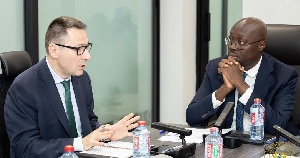- Home - News
- Elections 2024
- News Archive
- Crime & Punishment
- Politics
- Regional
- Editorial
- Health
- Ghanaians Abroad
- Tabloid
- Africa
- Religion
- Photo Archives
- Press Release
General News of Tuesday, 22 April 2025
Source: www.ghanawebbers.com
Ghana exceeds IMF reserve target ahead of programme completion date
Ghana has achieved a key milestone in its IMF programme.
The country increased its gross international reserves ahead of schedule.
This accomplishment comes a year before the programme ends in May 2026.
As of February 2025, Ghana’s reserves reached $9.3 billion.
This amount covers four months of imports.
Initially, Ghana was expected to meet this target by mid-2026.
Dr. Benjamin Amoah, a finance lecturer at the University of Ghana Business School, praised this achievement.
He believes it will help stabilize the cedi currency.
Improving reserves sends a positive signal to investors, he added.
Dr. Amoah urged the government to continue debt sustainability measures.
On April 15, 2025, Ghana and the IMF reached a staff-level agreement.
This agreement outlines economic policies for the fourth review of the Economic Credit Facility (ECF).
The executive board must consider this agreement next.
Once approved, Ghana will receive SDR 267.5 million (about $370 million).
This will raise total IMF support since May 2023 to SDR 1,708 million (approximately $2.355 billion).
The IMF noted that growth in 2024 exceeded expectations due to strong mining and construction activities.
The external sector improved significantly with solid exports and higher remittances.
International reserves have surpassed ECF targets as a result.
However, overall performance under the IMF programme declined at the end of 2024.
Preliminary data showed fiscal slippages before the upcoming elections due to rising payables.
Inflation also exceeded programme targets during this period.
Several reforms were delayed across various sectors including fiscal and energy areas.
In response, new authorities have taken bold steps to address these issues.
The government is auditing payables to assess their size and nature accurately.
Preliminary estimates show a primary balance deficit of about 3¼ percent of GDP instead of a targeted surplus of ½ percent.
To rectify these slippages, the government has enacted a budget targeting a primary surplus of 1½ percent of GDP for 2025.
They are also implementing public financial management reforms for better expenditure control.
Last week, an IMF mission engaged with Ghanaian authorities on structural reforms.
Their focus included enhancing governance and improving State-Owned Enterprises management in key sectors like gold and cocoa.
The mission met with Finance Minister Forson and Bank of Ghana Governor Dr. Johnson Asiama among others.
They expressed gratitude for continued cooperation from Ghanaian officials and stakeholders.











